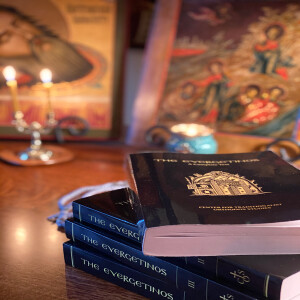
One of the amazing things about reading the lives in the teachings of the desert fathers is that we begin to see that we are part of the body of Christ and among the many who have sought to make the spiritual journey over the centuries. We aren’t Christians in isolation. This means not only that we hold and believe the same truths about the faith that have been revealed to us but also that we seek to embrace in all of its fullness the life and the love of that Christ has made possible for us. We struggle with the same wounds, similar dispositions and mindsets that affect the way that we view the world around us and the way that we practice the faith. The acknowledgment of this communion and the desire to breathe the same air and to travel the same path is a source of great strength for us. Not only are we guided by the teachings of Christ and the gift of His Spirit but also by the many Saints and Martyrs who embody this reality in their lives.
One of the great fruits of this is Hope. The struggle with the poverty of our sin, the sorrow that it brings can leave us feeling alone and isolated. But as we listen to the stories from the Fathers on contrition and how to shape this habit of mind and virtue, it is as if we are taken by the hand and guided toward Christ. The Scriptures tell us that we are to console others as we ourselves have been consoled. The Fathers console us in so many different ways. They do this most simply by presenting us with the truth of our struggle with sin and also the depth of God‘s mercy and compassion. They struggle so hard to prevent us from falling into despondency and give us the healing balm of their wisdom to keep us moving forward - even if we should make a wreck of our life on a daily basis.
On the most beautiful things they teach us in the Evergetinos is that contrition is not about self-contempt so much as it is about self-knowledge; of seeing the truth of the wound of sin and our need for the Divine Physician. What is asked of us is not perfection, but rather to live in a spirit of faith and repentance; with humble hearts to turn to the One who loves us and desires to heal us. These reasons alone are enough to convince a soul to seek constant nourishment and guidance from the fathers.
---
Text of chat during the group:
00:06:27 Bob Čihák, AZ: P. 249, F. From St. Barsanouphios
00:15:19 Bob Čihák, AZ: P. 249, F. From St. Barsanouphios
00:21:41 Myles Davidson: Chat GPT had never heard of the St. Barsonouphous / Buddha connection, for what it’s worth
00:23:36 Myles Davidson: Replying to "Chat GPT had never h..."
…nor an internet search
00:27:31 Rod Castillo: Replying to "Chat GPT had never h…"
I think you are referring to the legend of Barlaam and Josaphat. Barlaam was thought to have been the Buddha in Christian guise.
00:27:55 Lindsey Funair: Is it sinful to cry out of contrition over sins already confessed?
00:28:29 Anthony: I apologize to all: the story of Barlaam and Joseph is connected to Buddha. New Advent Catholic Encyclopedia mentions the connection.
00:41:11 Kate : I recently read that one of the fathers said that profound and deep sighs are the same as physical tears.
00:42:44 Lindsey Funair: Sometimes it would seem the physical tears are a blessing as the person would otherwise doubt their own sincerity if it weren't for the outward sign. So they can then experience the connection more purely. Because it makes it easier to accept, the reality of the state of the soul, without the distraction of being unworthy to talk to God. But it is very inconvenient when driving and attracts bad attention at church.
00:44:00 Nypaver Clan: Reacted to "Sometimes it would s..." with 👍🏼
00:44:33 Lindsey Funair: Groans, which have no understandable meaning, have been spoken of that way.
00:47:05 Una: If you want to stop crying during Mass, try inflicting pain on the side of your thumb with the fingernail of the opposite thumb. The pain will distract you as you try to breath through it (as with natural childbirth breathing). No harm will be done your thumb. Cry when you get home.
00:52:49 Adam Paige: “When he went to church on Saturdays and Sundays he walked alone in deep thought, allowing no one to approach him lest his concentration should be interrupted. In church he stood in a comer, keeping his face turned to the ground and shedding streams of tears. For, like the holy fathers, and especially like his great model Arsenios, he was always full of contrition and kept the thought of death continually in his mind.” - Abba Philimon (Philokalia volume 2)
00:54:33 Anthony: How do we distinguish real contrition or trying to be contrite versus grief for not living up to perfection, or a craven approach to God, or emotional instability? Or does this even matter, since you trust God to bring you along to His goodness in the end?
01:00:18 Lindsey Funair: Most of us have a hard enough time staying on the path that it is hard to imagine the temptation to stay on the path, but without walking forward, that becomes its own temptation.
01:14:46 Rebecca Thérèse: Thank you☺️
01:15:09 Lindsey Funair: Thank you, Father. Please include me for Saturday's email.
No comments yet. Be the first to say something!